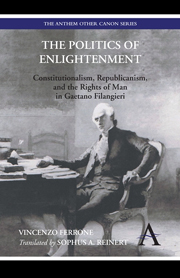 The Politics of Enlightenment
The Politics of Enlightenment Published online by Cambridge University Press: 05 February 2013
When Johann Wolfgang von Goethe visited Naples on his Grand Tour of Italy in 1786–1788, he was above all struck by his meetings with the ‘remarkable’ Gaetano Filangieri, heir of the Princes of Arianello, ‘one of those noble-hearted young men to whom the happiness and freedom of mankind is a goal they never lose sight of.’ Baffled, he could only admit that he had ‘never heard Filangieri say anything commonplace.’ From Goethe, this was quite a compliment. At the time, the young Neapolitan he frequented was principally lionized for his massive Science of Legislation, one of the most influential works of eighteenth century legal, political, and economic thought, translated into every major language in the European world and published in at least seventy different editions. Luminaries like Benjamin Franklin, who upheld a lengthy epistolary with Filangieri, found the Science of Legislation an ‘invaluable work,’ wishing for more volumes of it in the wake of the 1787 Constitutional Convention, but it also had popular appeal enough to be included in circulating libraries. In 1806, the Edinburgh Review called Filangieri's magnum opus ‘a work of philosophical excellence, which bears the traces of much learned research, and breathes, in every page, sentiments of the purest virtue, mingled with an undaunted spirit of liberty, and zeal for the improvement of mankind.’ Indeed, Filangieri was a man it was ‘impossible to venerate too much.’
To save this book to your Kindle, first ensure [email protected] is added to your Approved Personal Document E-mail List under your Personal Document Settings on the Manage Your Content and Devices page of your Amazon account. Then enter the ‘name’ part of your Kindle email address below. Find out more about saving to your Kindle.
Note you can select to save to either the @free.kindle.com or @kindle.com variations. ‘@free.kindle.com’ emails are free but can only be saved to your device when it is connected to wi-fi. ‘@kindle.com’ emails can be delivered even when you are not connected to wi-fi, but note that service fees apply.
Find out more about the Kindle Personal Document Service.
To save content items to your account, please confirm that you agree to abide by our usage policies. If this is the first time you use this feature, you will be asked to authorise Cambridge Core to connect with your account. Find out more about saving content to Dropbox.
To save content items to your account, please confirm that you agree to abide by our usage policies. If this is the first time you use this feature, you will be asked to authorise Cambridge Core to connect with your account. Find out more about saving content to Google Drive.